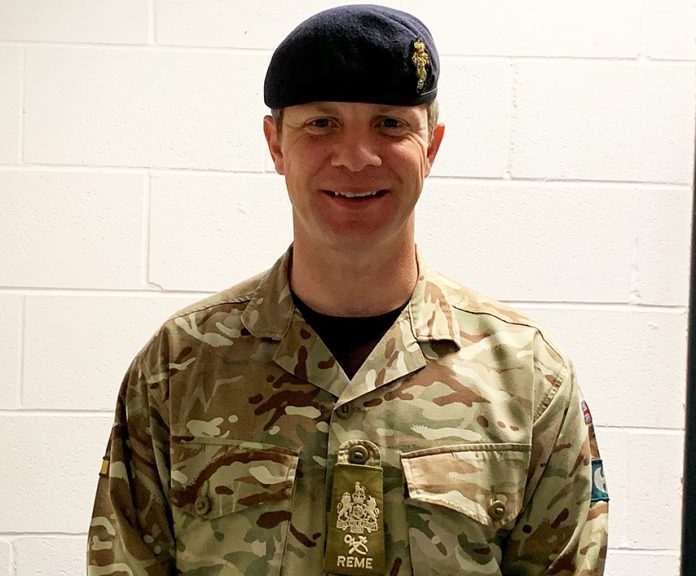Vignette 1. Warrant Officer Class 1 (ASM) Kev Burke
WO1(ASM) Kevin Burke is currently serving in Leuchars, Scotland. A native of Glasgow, since joining REME he has gained professional registration as an IEng with IMechE while also exploiting every available Army opportunity.
1) What made you join the Army, especially the Corps of the Royal Electrical and Mechanical Engineers (REME)?
I joined the Army straight from school, at 16 looking for job satisfaction, opportunities to work overseas and better pay than was available in ‘civvy street’. REME was mentioned in nearly all of the leaflets and the common theme was their resourcefulness in fixing equipment in all weather, in some far-flung places around the world! The image of a team of mechanics lifting a power pack from a Challenger 1 main battle tank really struck a chord with me. I wanted to be part of that team.
2) What have been the highlights of your REME career so far?
I have had a varied career; my first posting was to Germany working on Challenger 2 Tanks at 18. Later on, I served at both the Armoured and Royal Engineer Trials and Development Units, working closely with industry on urgent operational requirements for Iraq. In Afghanistan I led small multi-trade teams to maintain equipment, often at reach from logistical support chains, which tested my decision making and problem-solving as an engineering leader. Other highlights have included instructing young soldiers, gaining an HND in automotive engineering and working in Africa to design and deliver training on vehicles the Botswanan Defence Force had bought from the UK.
3) How does WO1 Burke differ from Mr Burke who first came to the Corps?
I have matured from a young, shy teenager lacking any real direction and ambition into a confident, self-motivated engineering leader.
4) What has been your biggest engineering achievement?
I was the Artificer Sergeant Major (ASM) for a 60-person team of Brigade Support Group. We conducted the second line (in-depth repair) Equipment Support, maintaining thousands of equipment items to keep them in the hand of the user. From planning the company training requirements to correctly training our people with the required skills for the equipment, to deploying and sustaining ourselves in the field. I can safely say that this was the biggest multi-faceted leadership task I’ve managed to date.
5) What transferable skills have you gained and developed throughout your REME career that make you stand out?
Looking at ‘civvy street’, I see so many similarities between what employers are looking for and what veterans already have to offer. My military service has instilled self-discipline, punctuality, motivation, loyalty and the ability to lead and work in a team. Also, I’m seeing translatable soft, professional skills gained whilst in the Army in the ‘about us’ pages and ‘essential skills’ of company websites. I am people focussed and I have happily exploited new technology and techniques. I am also well versed in audits, assurance checks and change management; change is the only constant. Industry will find a broad spectrum of skill sets in REME veterans.
6) Where do you see yourself in five years?
I leave the Army in 2022. For future civilian employment, I’d love to get involved in management, preferably within the engineering sector. I genuinely enjoy working with people, helping them to shine and delivering outputs as part of a wider team. I also want to continue working towards a degree, obtain additional professional registration and advance towards CEng status.







